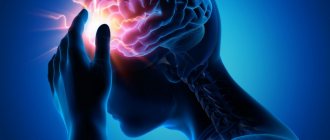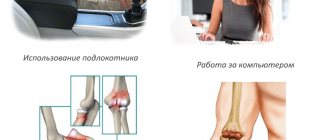HSDs and neurotics are very similar in their hypochondriacal behavior, and the trials that befell them are virtually identical: chronic stress, surges in blood pressure, disruptions in the functioning of the nervous system, lack of sleep - this is a very long list. However, there is still a difference between patients, and it lies not in the symptoms, but in the degree of their regularity. It often happens that dystonics become fixated on some unpleasant state and, in addition to VSD, also develop neurosis. Among neurotics, there are indeed a lot of VSDs. And one of the most common symptoms that such patients fixate on is a feeling of tension in the head.
Physiology of stress
Every person every day becomes a victim of the imperfections of the modern world. Work, social conditions, relationships with others - all this brings both positive and negative emotions. A person is happy, worried, experiences aggression and depression, and reacts nervously to some external influences. All this cannot but affect his psycho-emotional state. The result is nervous tension that accumulates over the years, taking away energy and strength for further existence.
The human nervous system is closely related to the functioning of internal organs and systems. Psychologists examined the human body from the physiological side - as a kind of consumer of strength and energy. Nervous excitement causes an immediate reaction in the body by releasing cortisol (the stress hormone). It is he who is responsible for the adaptive functions of the body. Cortisol causes an increase in blood glucose levels, which causes more active feeding of organs, especially the brain. As a result, the body can perform tasks that are beyond the normal state of a person, and becomes more resilient and strong.
When experiencing nervous tension, the adrenal glands also release adrenaline. This hormone performs two functions - positive and negative. The main feature of this hormone is increasing blood pressure, improving vision and hearing, and saturating muscles with glycogen. Thus, the body is prepared for new threats, for the dangerous influence of stressors. But there is also a downside to this process. Constantly being under conditions of psychological stress contributes to the consumption of strength and energy. And the more time the nervous system is exposed to such stress, the more the human immune system suffers. Therefore, psychophysiological adaptation is the only natural way to accept one’s own personality and its social role.
Susceptibility to NG: risk groups, prevention
Head neuroses affect people regardless of age, gender, or social status. The only proven fact: such problems are often experienced by emotionally excitable individuals who react violently to external and internal stimuli. Reflective, sensitive, creative natures, painfully perceiving failures, constantly worrying, are the goals of the disease.
Today, a frightening trend has emerged: cephalic neurosis affects young people, teenagers, and children. Increasing social pressure, inflated demands, richness, and complexity of educational programs provoke the development of various neurological abnormalities. Prevention:
- engaging in fruitful, distracting activities - hobbies, creativity;
- communication, maintaining trusting relationships with parents, friends, significant others;
- maintaining an active, healthy lifestyle – sports, dancing, swimming;
- proper nutrition, exclusion of heavy, fatty, junk foods;
- compulsory daytime walks, daily exposure to fresh air, out-of-town trips;
- practicing recognized spiritual practices - yoga, meditation, martial arts;
- maximum adherence to the daily routine, long night sleep (from 8 hours, go to bed until 23.00).
Compliance with the listed preventive measures will help avoid cerebral neurosis, strengthen the nervous system, and give the body the necessary relaxation. Learn to control your own reactions, emotions, feelings in order to effectively defeat such illnesses.
Causes and symptoms of nervous tension
Emotional breakdown (nervous breakdown) is a consequence of long-term or short-term influence of stressors on the body. The main threat to the nervous system can be the accumulation of negative feelings and emotions due to the influence of external and internal factors. In order to combat the threat to your psychological state, you need to understand what causes nervous tension and what consequences it can lead to.
Causes of nervous tension
Internal tension is characterized by a change in a person’s mental and physical state. Overexcitation associated with the influence of external and internal factors, the formation of a dangerous emotional background inflames the nerve connections, making them weak and susceptible to destruction. The main causes of emotional distress are:
- Insults and insults received undeservedly. Even after a while, a person cannot get these unpleasant moments out of his head.
- Undeserved criticism at work or at home. Due to the fact that others do not notice a person’s efforts, he experiences anxiety, resentment and even anger.
- Complexity. The accumulation of negative emotions and the inability to express them or share them with others lead to mental overexcitation.
- Osteochondrosis, musculoskeletal injuries and other diseases.
Awareness and perception of one’s own Self, understanding one’s role in society - all these are the right goals of modern people.
It is important to learn to control your feelings and emotions, find ways to solve any problems and conflicts (sometimes you can and should avoid them) and try to share your experiences with loved ones.
The first steps to combat stress should begin with rethinking your attitude towards family members, friends and colleagues. Excessive demands only aggravate the mental state. The path to spiritual harmony is thorny and requires painstaking work on yourself.
Osteochondrosis can provoke severe nervous tension
Symptoms of nervous tension
Nervous tension and stress arise due to problems and situations that at a certain moment may seem hopeless to a person. When a person is unable to overcome a threat “in the bud,” it is deposited in his memory and is constantly supplemented by more and more unresolved situations. Over time, accumulated emotions make themselves felt, expressed through symptoms such as:
- chronic emotional suppression leading to depression,
- headaches of a constant or periodic nature,
- muscle “stiffness”, causing difficulty in moving the head and limbs,
- constant physical tension of the body (difficulty relaxing, finding comfortable positions for work and rest),
- “deceptive” signs of a pathological condition (cough, fever, indigestion, etc.)
Nervous tension, turning into chronic stress, bothers a person “gently”, gradually spreading its negative impact on the body, and the symptoms seem to be invisible. The main problem is adaptation to new mental conditions. Life is becoming more and more a routine, from which it is increasingly difficult to get out. Only the subsequent stages of the development of the disease are expressive; a strong emotional and mental disorder can cause a feeling of anxiety and lead to general exhaustion of the body.
Muscle tension
Problems with nerves can also be pathological. They arise as a result of pathological changes in the musculoskeletal system, as well as diseases such as osteochondrosis. Along with emotional stress, health problems are manifested by discomfort such as muscle stiffness and tension. In a person susceptible to pathological disorders of nerve connections:
- often headache and back pain (pain may be constant),
- difficulty moving your head, arms and legs freely,
- a pressing, itching or aching pain is felt in the problem area.
It is difficult to get rid of physical discomfort that interferes with normal life activities and relieve stress through self-medication.
In addition to the help of a psychologist, you may need consultation and examination with a neurologist and other specialists. Treatment at home is not excluded, but according to a program planned by the attending physician.
Neck pain, one of the symptoms of muscle tension
How to relieve muscle tension
Muscle tension of a neurotic nature, manifested by muscle tension, can be relieved not only with the help of medications. Most often, the approach to therapy is complex and includes:
- Thermal envelopment. Taking a bath with essential oils added, as well as relaxing in bed under a warm blanket will not only relieve a person from a stressful state, but will also lift his spirits.
- Massage. Indispensable for osteochondrosis and problems with the spine. Massage relieves stress, muscle fatigue, and inflammation of nerve endings.
- Change of environment. It will help if the cause of muscle tension is stress. It will be easier to cope with the problem if a person suffering from nervous tension tries to forget all old grievances and misunderstandings, discover new opportunities and prospects, find a hobby, etc.
- New home arrangement. Physical pain makes people think differently about the choice of furniture or pillows. To relieve tension, you need to choose them more carefully, focusing on your own convenience and comfort.
- Physical exercise. Regular walking, simple bending of the torso, swinging the arms and tilting the head to the sides will help relax the muscles. Static exercises are also popular (only the muscles work, and the body remains motionless).
- Breathing exercises. A person who has muscle tension must learn to breathe correctly. Because thanks to this, all muscles and internal organs are enriched with oxygen.
- Sensitive attitude towards your health. If you have any cause for concern, you should seek medical help.
Your doctor will tell you how to relieve muscle tension with medication if you have not been able to help yourself using the above methods. Modern pharmacology is at a high level, so choosing an effective remedy will not be difficult.
How to get rid of anxiety and can a psychologist help?
Any psychologist is trained to work with anxiety and stress, but there are psychologists who may focus on working with anxiety and anxiety disorders more than others. If you are struggling with anxiety or have been diagnosed with an anxiety disorder, you may choose to receive advice and treatment like this. Below are things you should look for when choosing a psychologist.
What type of therapy do psychologists use?
Many different types of therapy can be used to treat anxiety. Before you start going to sessions, you should find out what type of therapy the therapist practices. The best therapist will use a combination of different techniques. Some of the most commonly used forms of therapy to treat anxiety include:
Cognitive-behavioral therapy is a highly effective, established treatment for anxiety. In this approach, you change your thoughts and behavior. Patients learn strategies to help them manage their anxiety in healthy ways.
Eye Movement Desensitization and Reprocessing (EMDR) – This type of counseling is growing in popularity, but is not as widespread as other forms. It works as follows: the psychologist teaches clients certain eye movement patterns while simultaneously presenting non-stressful situations that will help them get rid of feelings of anxiety and worry.
Medication - Some medications can help people with anxiety disorders gain control over their emotions while they work to learn new skills to cope with anxiety and stress.
Biofeedback – This type of counseling works by showing people how their body reacts to anxiety, stress and worry. As they sit for the sessions, they are hooked up to machines that show them what their blood pressure, heart rate and other physical body responses are. They can see what happens when they become more stressed and then how their body reacts when they use certain techniques to reduce stress and anxiety. This helps them learn what they feel physically when their anxiety gets out of control, and how they might feel if they keep it under control. It also helps them identify feelings when their efforts bear fruit.
These are just a few of many options for treating anxiety. Therefore, you may want to talk to your therapist first to find out what treatment approach they use.
Quickly relieve tension
If, as a result of emotional communication during a period of active work or mental activity or for some other reason, a person reaches an “extreme” mental state (tension), it is important to quickly get rid of it and remove irritants. You can relieve nervousness and return to a state of emotional stability using different methods:
- You should avoid the influence of unfavorable factors.
- It is necessary to retire (if possible).
- You should remove all unnecessary jewelry and things (especially for women).
- You need to take a shower or a warm, relaxing bath with lavender essential oil.
- It is important to allow yourself to rest by getting a full 8 hours of sleep or taking a day off.
If you harbor a grudge against someone in your soul, you don’t need to keep it to yourself. You can share your feelings and experiences with loved ones. If it is not possible to cope with a stressful situation, you can use art therapy methods to relieve stress. Psychologists are confident that relieving tension is more effective when a person is completely relaxed and mentally switched to creative activities or a favorite activity.
Experts advise women to draw, sculpt with clay, or plant flowers. The brighter the flowerbed is, the more it looks like a rainbow, the better for the woman’s emotional state.
With each flower planted, all worries, pains and fears go away. A man can play sports, listen to music, read books, find some interesting activity for himself.
A bath with aroma oils will quickly relieve tension
Taking medications
Despite the wide range of drugs that can relieve nervous tension and get rid of stress, taking medications must be agreed with a doctor. The fact is that most medications have a number of contraindications and side effects, sometimes even life-threatening.
Thus, tranquilizers and sedatives, which are intended to relieve signs of nervousness, are prohibited from being combined with alcohol and narcotic substances.
In addition, other contraindications are also important. If you don’t have time to relieve stress using any traditional methods, you can buy drugs like:
- "Quattarex" (capsules). Sedative.
- "Tenoten" (tablets). Helps with neuroses and psychosomatic disorders. This drug is contraindicated for pregnant and nursing mothers.
- "AirFit" (spray). Used to strengthen the nervous system, as well as for colds.
The medications should be taken strictly according to the instructions, without exceeding the dosage of the medication. At the slightest reaction of the body to the components of the medicine, you should consult a doctor.
"Tenoten" is prescribed for neuroses
What to do if your hands shake when excited?
- Contact a psychologist or psychotherapist
Psychotherapy is the most reliable way to cope with tremors caused by anxiety. Psychotherapy may require a certain investment of time and money, but the results are stable.
- See a psychiatrist
Psychotherapy does not give immediate results. Therefore, if you need to quickly cope with tremor, you should consult a psychiatrist for medications. When taking medications, hand tremors during anxiety decrease or disappear, but only while taking the medications.
- Contact a neurologist
If you are not sure about the purely psychological nature of tremors, then you should make an appointment with a neurologist to rule out other causes of hand tremors during excitement.
- Find appropriate self-help methods
You can read about self-help methods at the end of the article.
Folk remedies
A safer way to deal with stress is to use folk remedies. The fact is that most popular recipes include only plant ingredients. They are completely safe when used correctly and can even be used to treat children. The most popular folk remedies are:
- Hawthorn decoction. 30 gr. The flowers of the plant must be filled with 100 ml. boiled water. Boil for 15 minutes, leave for 1 hour, strain and drink. It is best to drink the decoction 3 times a day.
- Valerian tincture. Take 30 drops 3 times a day.
- Herbal teas (melissa, mint, hops, linden, etc.). You can buy ready-made mixtures at a pharmacy or mix the components yourself.
You can also add lavender infusion to a warm bath. But this is a troublesome matter. Add the essential oil of this plant quickly and equally effectively. Oils of orange, rosemary, neroli, frankincense and eucalyptus will calm your nerves. Each person can choose a component that suits their scent.
Hops, a folk sedative










